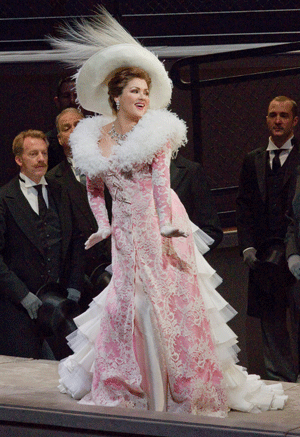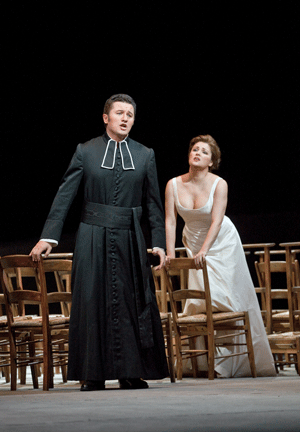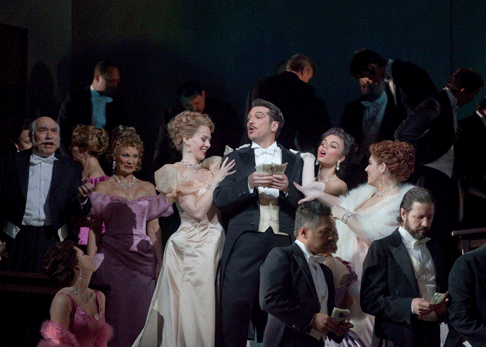There are other juicy
roles in the opera, notably that of her Chevalier des Grieux, but a
Manon with a vapid Manon never works (no pun on working girl
intended). At the Met, Manon has been a major vehicle for singing
actresses with small voices but great cachet: Bori, Say„o, Albanese, de los
Angeles, and across the Plaza it was a triumph for the vocal acting of Beverly
Sills, my first Manon. More recently I have heard RenÈe Fleming’s
listless interpretation at the Met and Natalie Dessay’s rather more
on-target version (opposite Jonas Kaufman) in Chicago.
Anna Netrebko has appeared in two DVDs of the opera in rather different
styles as she adjusted to different directors’ visions. Now she has come
to the Met in a production by Laurent Pelly that allows her to be Manon as she
understands this very young, very material girl. A fine actress as well as a
talented and hardworking singer with a lovely if not always ideally exploited
voice, she makes a thrilling, fully realized sensation in the part.
 Anna Netrebko as Manon Lescaut
Anna Netrebko as Manon Lescaut
Netrebko brings rather more voice to Manon than is usually the
case. She restrains her full-throated sound in the opening scenes, when Manon
is fifteen and—at least in Act I—a virgin, albeit une jeune
fille en fleur. She then exploits the voluptuous grandeur of her sound to
the full to play the haughty beauty of the Cour-la-Reine and the passionate
seductress of St. Sulpice. She reaches an ecstatic pinnacle in the Hotel de
Transylvania scene, and her glow of sensual delight in the thrill of life and
high society and being an object desired by Des Grieux and every other man in
the room (and envied by all the women whom she used to envy) flushed body and
voice with narcissistic delight. The pitiful comedown (enhanced by Chantal
Thomas’s despairing, empty landscape—the best setting of the
production) was perhaps not so sickly, so evanescent as the usual Manon plays
it. Netrebko still had plenty of lung power to display, expressive more of
agony than resigned regret. This makes me eager to hear her take on
Puccini’s Manon Lescaut, which requires full-blooded sensuality
in the voice from start to finish and hasn’t had it since Freni and
Scotto stopped singing the part.
In any case, I can guarantee that those who go to the opera for Netrebko in
Manon will not find a half-understood, half-realized or lackluster
portrayal. She is bursting with life even in her saddest moments, which makes
the fluster she creates among the men around her perfectly
comprehensible—even in the Pelly production that (in keeping with our
pornographic age) insists on making explicit, shoving our nose into, what
Massenet is content to imply: the rape fantasies not merely imagined but
enacted by just about every male on stage, of Manon and of every girl in the
corps de ballet. (I think Massenet had it right, and Pelly’s direction
undercuts the effect of Manon’s fate.)
 Piotr Beczala as des Grieux and Anna Netrebko as Manon Lescaut
Piotr Beczala as des Grieux and Anna Netrebko as Manon Lescaut
Piotr Beczala plays Des Grieux. He is goodlooking, tender, frenzied by
turns, a fine actor and a sympathetic figure. His voice always gives pleasure,
interpreting and expressing; if it sometimes fades to indistinction in the
distant reaches of the house. Michael Todd Simpson replaced Paulo Szot as
Manon’s corrupt cousin at the last minute, presumably with little
preparation—but there was nothing in his professional, casually sensuous
performance to indicate that anything (in life or this story) was new to him;
he was entirely at ease, his voice agreeable and suave, his acting witty and to
the point. I am told he is an admired Don Giovanni and I am eager to hear him
take it on. Christophe Mortagne, light of step and livid with, alas, not quite
impotent indignation, was quite fine as the rouÈ Guillot. The trio of cocottes
was played by Anne-Carolyn Bird, Jennifer Black and Ginger Costa-Jackson,
top-notch casting for these small but far from insignificant character roles.
They set Manon off, inspiring her to her life of ill-fame, but since they have
no hearts, they have survived the catastrophe to which she succumbs.
The production is set in fin-de-siËcle Paris, an era in which girls
of ill fame (and accusation) were not sent to exile in Louisiana. I am
not sure what Mr. Pelly thinks he has gained by abandoning the proper era
except anything-as-long-as-it-hasn’t-been-done is the current style. Nor
is there any point at all in having Des Grieux sleep in a bed in the
nave of St. Sulpice except (as we guessed from the rise of the curtain on the
scene) it will enable the act to end not with Manon and her priest taking hands
and running off but with them wallowing on the blankets. Is this realistic? Do
you, if you seduce someone, not seek privacy to consummate the event? Again: It
is merely Pelly slavishly following current fashion, which is as evanescent as
adolescent passion. I can’t wait to be free of it and of the artists who
succumb to it.
 Anne-Carolyn Bird as Poussette, Paulo Szot as Lescaut, Ginger Costa-Jackson as Rosette, and Jennifer Black as Javotte
Anne-Carolyn Bird as Poussette, Paulo Szot as Lescaut, Ginger Costa-Jackson as Rosette, and Jennifer Black as Javotte
Fabio Luisi led the Met orchestra in a suave, elegant account of this long,
tuneful score and made the dramatic points: Real emotions lurked under the
frivolous surface.
Someone should really tell the Met Titlestm that “abbÈ” does
not mean abbot or imply the existence of an abbey; it is simply a polite way to
address a priest in French.
John Yohalem
image=http://www.operatoday.com/Manon_Met_2012_02.gif
image_description=Anna Netrebko as Manon Lescaut [Photo by Ken Howard/Metropolitan Opera]
product=yes
product_title=Jules Massenet: Manon
product_by=Manon Lescaut: Anna Netrebko; Des Grieux: Piotr Beczala; Lescaut: Michael Todd Simpson; Pousette: Anne-Carolyn Bird; Javotte: Jennifer Black; Rosette: Ginger Costa-Jackson; Guillot de Morfontaine: Christophe Mortagne; De BrÈtigny: Bradley Garvin; Count des Grieux: David Pittsinger. Chorus and orchestra of the Metropolitan Opera conducted by Fabio Luisi. Performance of April 17.
product_id=Above: Anna Netrebko as Manon Lescaut
Photos by Ken Howard/Metropolitan Opera